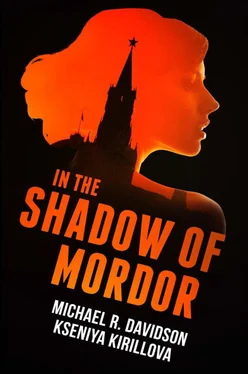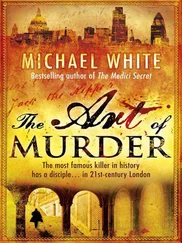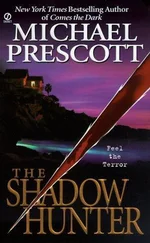“Help?” Petrov was screaming now and rolling his eyes. “They tried to destroy our country for ten years and nearly succeeded. They stole from her every day, broke her to pieces. If it hadn’t been for Putin…”
“Destroyed?” Shtayn’s voice was filled with irony. “Mr. Petrov, believe me, if they wanted to destroy you, they would have done it long ago.”
There was a sprinkling of laughter in the auditorium, and Olga clenched her fists.
“Immediately after the fall of the Soviet Union the remains of the KGB became tightly involved with the criminal class. You know very well that after Yeltsin it was former ‘Chekists’ who monopolized resources and power in Russia. I find it strange that against the background of an orgy of crime, banditry, so-called ‘new Russians,’ mafia gunfights and all the other unsavory realities of the ‘wild 90’s,’ you still blame it all on democratic reforms and the West. In the 90’s crime was due to people from the Soviet KGB, not young reformers. The West was not happy with this symbiosis and even suffered from it. I’ve collected a lot of information about how these ‘respectable’ vory v zakone [9] “Thieves in the law” a traditional Russian term for certain criminals
laundered their ill-gotten gains in foreign banks, all the while establishing espionage networks. The activities of their agents are directed primarily against the West to discredit and corrupt its basic institutions. If you, Mr. Petrov, should have friends in the KGB, I suggest you ask them about it.”
The laughter that greeted this remark petrified Olga with shock. That’s wrong. He can’t be right. It was a miracle that Russia survived the 90’s. The West failed then, but they would try it again .
She wanted to flee the auditorium. It became physically difficult to listen to Shtayn. But she dared not bring attention to herself. She should never have come. This was disaster .
A young female voice rang out from the audience. “Isn’t it hard for you to do this? Russia is your country. Isn’t it hard to work against her?”
To Olga’s astonishment, Shtayn did not try to justify himself or hide behind a smokescreen of pretty words to the effect that he was doing this for Russia and not against her — no false patriotism. He simply said, “Miss, have you visited any local parks?”
What kind of answer is this?
He continued, “Sometimes it’s very good go visit parks, simply to walk around, unwind a little, breath fresh air. Children play there, just like they play in the courtyards of Russia. Can you tell which children are ‘ours’ and which are ‘theirs?’ Just go and take a good look and them and their parents for maybe a half-hour. Stroll around the streets and see the houses, everything around you. Then ask yourself — is this worth defending?”
The girl replied with some heat, “But there are parks in Russia, too, and a peaceful life.”
“There are, undoubtedly there are,” said Shtayn, “But Russia is an aggressor. Either through brute force or deception Russia strives to bring destruction to other countries. I’ve seen the results with my own eyes. I’ve seen how they try to destroy everything others have created. I’ve followed them for many years and seen nothing apart from a permanent desire to destroy. They bring only strife to the world, only eternal blackmail with their oil and gas. What kind of future is Russia preparing for her children? To be sent as cannon fodder in the Donbas, to kill foreigners? To end up in prison for a careless cartoon posted in a social network? Or to quietly drink themselves into a stupor, fearing to say what they think? Is it worth defending such a place?”
“But that place is your homeland.” The question reflected Olga’s thoughts.
“Yes, it is my homeland. I don’t have American citizenship, and I don’t know if I ever will. But the fact of my birth does not cloud my ability to distinguish the guilty from the innocent, freedom from slavery, happiness from force. For me, the innocent will always be dearer than the guilty. I don’t wish ill for Russia, but I will always defend those who are innocent against aggressors and thieves. And for me, a country which can provide its own citizens and others happiness rather than despair is worthy of defense. Do you see how simple it is? It’s nothing personal, nothing more than an objective view of the world. Truth and conscience should not depend on where one was born.”
His logic was perverse, openly and rudely unpatriotic. He spit on his country and didn’t hide it, but he possessed some special power that demanded respect and did not jibe with her image of a traitor. Could treason be worthy of respect? The man was an enemy of her country. He did not even pretend to be a patriot. What more was there to think about?
She left the auditorium, hiding herself in the crowd, as she cast a venomous glance back at her target. She and her colleagues must spoil his plans, compromise him somehow.
All of what Shtayn said, the clever manner in which he manipulated people would go into her report to Karpov. Her mission was almost complete.
“Life on earth is suffering on the path to Heaven.”
Mid-November is early for a snowfall in Washington, but white flakes were falling from an iron dark sky over Arlington. Forecasts said there would not be a heavy accumulation, but road crews were out in force with their clumsy trucks, distributing salt and sand.
Mark Shtayn carefully increased his pace as he approached the entrance to the metro station and the anticipated warmth inside. A ten-minute ride would take him to the Dunn-Lorring Metro Station where he expected his car to be covered with the white stuff.
He did not notice the woman behind him.
For someone in his position, he was habitually unaware of his surroundings and the people around him. This was attributable to the fact that he was usually deep in thought and today the snow forced him to pay close attention to his footing in the slush on the pavement.
The young woman was unremarkable, unless one were to look closely into her eyes and notice a glassy vacancy which might be associated with drug use, an almost trancelike state. Even that was unremarkable these days. She wore a snow-dusted heavy winter coat that almost entirely covered her, and a knit hat pulled far down. Her hair was dark where it strayed from under the hat.
She had no idea where she was, not even the name of the city. The drive had been long as she rode docilely between the two men in the old truck. She followed the man onto an escalator that sank under the curved, metal and glass roof sheltering the entrance to the Metro station. Behind her, cars with their wipers working crawled along the wet street. Such cars, and so many of them, the likes of which she had never seen in her mountainous homeland.
The two men had deposited her on the street a few moments ago, but she could still see them where they waited on a side street ahead. Their eyes were upon her urging her on.
She was weary, and the clear liquid the older man had given her to drink made her feel as if her feet did not touch the ground, as if she were caught up in a current that effortlessly carried her along like flotsam on a great, heaving sea. Her will was not her own but was subordinated to a greater volition, something glorious. Try though she might, she could recall only imperfectly what her life had been before and so far away. Now she was someone with a purpose, someone almost holy.
What was it she was supposed to do? Oh, yes, find the center of the crowd on the train platform.
The escalator carried her down, down until she was on the platform surrounded by people bundled against the cold, all of them too intent on their own cares to notice a lone girl in a long, dark coat. She struggled to concentrate on her task as the train slid into the station.
Читать дальше












